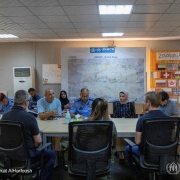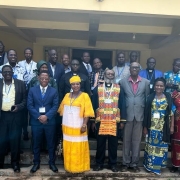The Rise Of Religious Extremism In Africa
In this edition of Afroscope, we delve into a matter that is of great concern for the Church, especially Christians living in difficult contexts. Africa is known as a religious continent with peoples of extreme spirituality that cut across three predominant religious families – traditional religion, Islam and Christianity, each of which is present in large numbers. Religious extremism has been used to describe any faith-induced action that is a deliberate attempt to inflict harm on others. Liebman (1983) views religious extremism as the desire to expand the scope, details and strictness of religious law; social isolation; and the rejection of the surrounding culture. It includes the formation of violent religious movements and the expression of extreme and unjust positions or actions in the name of a religious faith
i. Christian Persecution
West Africa has been the target of a sustained Islamist terrorist onslaught for many years, leading to massive human causalities, the loss of property, and destabilization of socio-economic, religious and cultural processes. A major target of these attacks has been Christians and churches. John L. Allen Jr. captures this scenario when he notes, “Just as Africa leads the pack in terms of Christian growth, it has also become one of the primary fronts in the global war on Christians.”
Christians have experienced persecution since the beginning of Christianity. Christians were subjected to all forms of trials and persecution from the brutal Roman emperors such as Nero, Claudius, Domitian, Diocletian, and Hadrian. Examples of early Christian persecution could be drawn from the Edict of Diocletian which finds parallels in the West African context today. In 303 A.D. Diocletian issued an edict which resulted in the destruction of Christian scriptures and places of worship, prohibited Christians from assembling for worship, led to the arrest of Christian clergy, demanded homage and sacrifices to Roman gods and goddesses, and sentenced torture and death passed on Christians who refused to renounce the Christian faith. The resolve of the radical Islamists to stamp out Christianity in West Africa, which has made Christians the prime target of their attacks, is a replica of early Christian persecution under Diocletian and other emperors.
John L. Allen Jr. in his book, The Global War on Christians, lists ten factors responsible for the present global onslaught against Christians, some of them include:
- Christianity is the largest religion in the world, with 2.2 billion adherents, so its raw numbers on any index are likely to be larger than everyone else’s.
- Christianity is experiencing phenomenal growth around the world, especially in its evangelical and Pentecostal forms, and much of that growth is coming in dangerous neighbourhoods such as parts of the Asian subcontinent, sub-Saharan Africa, and even regions of the Middle East. In some places, this growth threatens the traditionally dominant position of other religious groups or the state.
- Aside from Islam, most non-Christian religions are not experiencing the same missionary success or don’t have the same missionary ambitions. As a result, they don’t tend to attract the same attention and resentment.
- Christians in some places have become outspoken advocates for human rights and democracy, which means they’re seen as threats to authoritarian regimes especially since Christians often can plug into international networks of support that most other religious groups don’t have.
- Christians at the local level are often identified with the West, even though that’s almost always inaccurate.
ii. Role of Evangelicals in the wake of Persecution
So what should our response be as the church of Christ, can we sit back and fold our hands doing nothing while our brothers and sisters are increasingly in more and more danger of increased persecution?! That is not an option, you believe that is not an option we can afford to take either and I imagine that is why you are here today.
Our world view as modern Africans, Evangelicals included has largely been influenced by the West. In respect to human development, we largely hold, erroneously so, that the spiritual and the physical are separate and distinct entities. Simply put, this is a belief that there is a spiritual world where God exists and acts, and then there is another world-physical, the real world, where we see, touch, and smell. This is central to what is called modernity and is central to modern culture. It is embedded in the marketplace, in theologies, in information technology, it is taught in schools etc. As a consequence, on our Sundays, we operate in the spiritual realm, and then from Monday, we unwittingly act like atheists in the physical world, the real world.
We are captive to the dichotomous worldview of spirituality and physicality. To contribute meaningfully as Evangelicals, we need to unlearn to learn, we need to reconstruct our world view in the manner that
God wants. Why was Exodus of the Bible in the first place if God’s interest is only spiritual? Why is He- being spiritual, Father of the fatherless, Husband of the widows, why is He concerned with the poor? and why is He – being spiritual, Creator of the heavens and the earth both spiritual and physical? I hope the answers to these questions are obvious? If we divorce God from the physical, we err. If we divorce God from the physical we have an imbalance in the whole human life including development.
iii. Unity
As Christians, we are obligated to support our persecuted brothers and sisters in writing to the church in Corinth, Paul writes: ‘If one part suffers, every part suffers with it’ (1 Corinthians 12:26) and as a response to that, at the heart of The Association of Evangelicals in Africa, is the zeal to drive and mobilize resources for the freedom of all our brothers and sisters to express their love and worship of God without fear of violence or other forms of persecution. But we will be hard pressed to do this alone, We, the church and evangelicals need to band together as a collective to not only pray in concert with other believers and send encouragement but to also compel governments and the United Nations to correct the inhumane mistreatment of Christians that have gone on for far too long! There is immense power in unity and in numbers. Ecclesiastes 4:9-12 tells us
‘Two are better than one,
because they have a good return for their labour: If either of them falls down,
one can help the other up.
But pity anyone who falls
and has no one to help them up.
Also, if two lie down together, they will keep warm.
But how can one keep warm alone?
Though one may be overpowered, two can defend themselves.
A cord of three strands is not quickly broken.’
Sending forth missionaries to the areas of persecution and relief efforts towards the same is easier and more effectively done as one body than each separate group trying to do the same. Without cohesion, we may end up aggravating the situation instead of helping.
Unity within the church can help us accomplish;
- Gospel advancement
- Trainings (Advocacy for Pastors, politicians, religious rights, responsibilities for church to advocate, Bringing Christian influences to those that matters. A need for a coordinated sustained approach. Skills and journalists) resource sharing networking e.g. digitization legal expertise,
- Advocacy (Women issues, human trafficking etc.).
- Rehabilitation for the persecuted church (trauma training & discipleship)
- Digital Broadcasting including Podcasting





